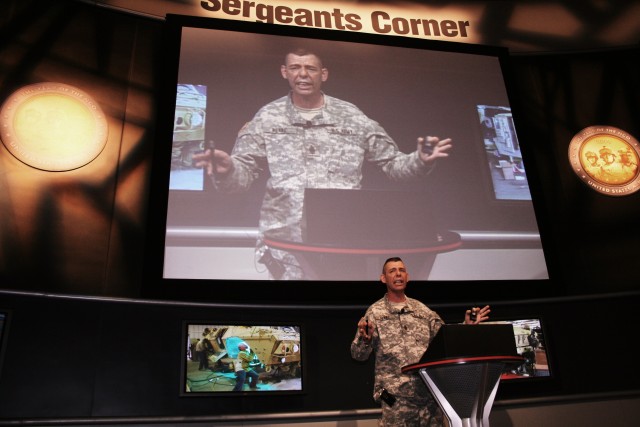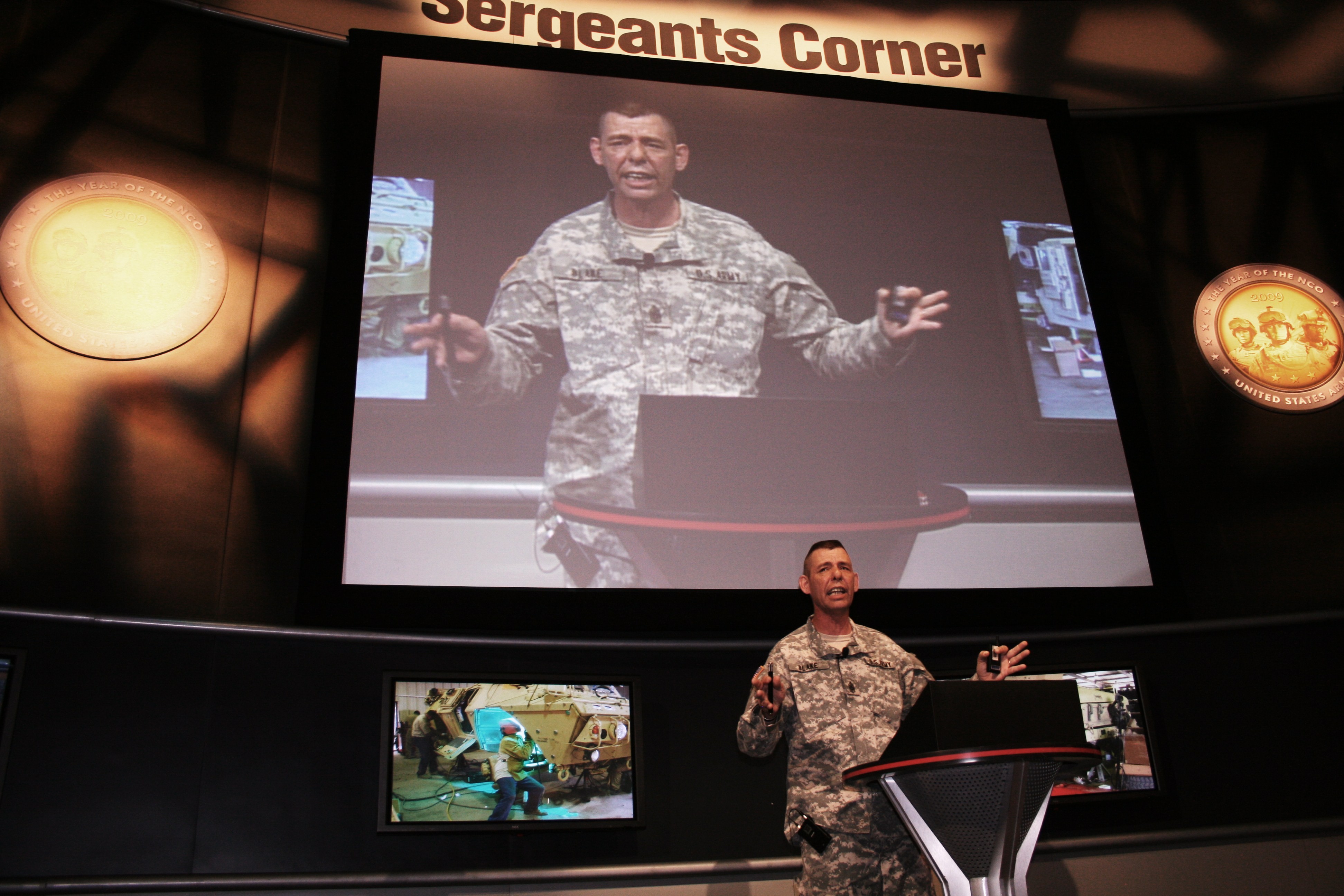
WASHINGTON - Taking care of Soldiers and their families is a big focus of Reset, said Command Sgt. Maj. Stephen D. Blake, the Army Sustainment Command's top enlisted Soldier speaking at the Association of the United States Army's annual gathering here Oct. 5-7.
Blake gave a very passionate presentation that included a PowerPoint presentation augmented by a jumbo video screen. But, the enlarged screen was not needed, as all eyes were on him during his intense mid-day delivery titled "AMC Reset Mission" in the Walter E. Washington Convention Center during the second day.
"I'm a command sergeant major, not a general. My focus is always about the Soldiers ... always on the mission first," Blake opened, setting the stage for his following remarks.
Reset is a series of actions to restore Army field equipment to a desired level of combat capability commensurate with a unit's future mission.
Reset is part of the Army Force Generation or ARFORGEN which is a structured progression of increased unit readiness over time, resulting in recurring periods of availability of trained, ready, and cohesive units prepared for operational deployment in support of combatant commander requirements.
Interwoven throughout his presentation was the concept of "Materiel Enterprise" or ME. It is one of the Army's four core enterprises and is responsible for materiel management from concept to combat, according to Army doctrine. The Army Materiel Command is partnering with the Office of the Assistant Secretary of the Army for Acquisition, Logistics and Technology to adopt an enterprise approach - communication, cooperation, and collaboration - to this end.
"We blend well with our environment - invisible," Blake said of ASC/AMC. "Who cares' It's all about the product. What am I doing for the Soldiers' What I am doing for their families' Do they have what they need' Do they have time to train' Time to fight' Are we bringing them the right stuff'" Blake rhetorically asked.
But as Blake repeatedly told attendees, this is not just a process for equipment, but rather a process that affects the quality of life Soldiers and their families experience.
"All the equipment they redeployed is broken. We've got to get it from them. We've got to get it fixed before they got into MRE [Mission Readiness Exercise] six months later," Blake said.
"All the equipment left in the rear - that we took from them the whole year - we've got to hand it back to them at the six-month point. Then we take it back from them after their certification because they're going to deploy again," Blake said of this ongoing cycle during wartime.
This equipment left at the home installation is known as Left Behind Equipment or LBE.
LBE is equipment a unit does not take with it during a deployment and can be re-issued elsewhere to be used for training or to other units returning from deployment. Often, it must be repaired to bring it up to standard.
Referencing LBE, Blake said he knows three things from his rank and position: that Soldiers want a leader they can count on; that Soldiers want to believe in their individual skills and have confidence in their equipment; and Soldiers want to believe and trust their battle buddies.
"That equipment piece of the whole thing is just as important as that leader or that buddy left and right," he said.
The numbers can be mind-boggling regarding equipment as Blake cited Fort Hood, Texas - the Army's largest installation and only two-division post - as an example. He said 70,596 different pieces of equipment were serviced there just in a 12-month period.
"We got to maintain visibility of our equipment to keep it ready for that person in another country at another time that would do us harm," he said.
The roles, Blake said, that AMC/ASC have are to restore the Army's combat capability; to repair its equipment; to replace equipment if needed; and, to recapitalize it. "We need to ensure our commanders have the time and the tools to be in the fight every day," he said.
Blake conveyed a moving testimonial from a sergeant major wounded in combat receiving treatment - his 15th surgery - at Walter Reed Army Medical Center. While other life-quality concerns were discussed, Blake said the sergeant major kept emphasizing one certain piece of equipment as the wounded Soldier's wife stood by and participated in the discussion.
"The main thing that sergeant major told me at least 15 times was how good that vehicle - MRAP - was," Blake said, referring to the Army's Mine-Resistant Ambush-Protected vehicle used in Southwest Asia operations.
"All they could tell me was 'You wouldn't believe how good that MRAP was,'" Blake relayed. "They [the Soldiers in the blast] got that truck because it was the right truck at the right time and the right fight," he said. "We can't afford to let our war-torn equipment go to pieces in the rear while we're focused on the fight forward."
Blake also took the opportunity to give high praise to the civilian workforce - Dept. of the Army and contractor - in their vital role in supporting the warfighter and their country.
"We've got 80,000 civilian contractors and DoD employees who serve that patch (AMC) every day providing a service to our Soldiers and their families," Blake said.
In his travels to ASC footprints throughout the globe, Blake said it's more than obvious to him of the dedication and concern of the civilian workforce.
"They work hard ... their work is a representation of their pride ... about what they give back to the Soldiers and their families in the fight - that's patriotism," he said. "You can't put a mark on that because they care about what they're doing for the Soldiers every day. It matters to them."
Blake said the civilian workforce under AMC/ASC are in the Army vehicles traveling Afghanistan's roads.
"Your mark, your pride, your handshake - our Soldiers, our leaders are in the vehicle with them. We're in the fight with them every day. I can tell you it's important that everything's right when you travel this road," Blake said.
In the end, listening to those Soldiers in combat is crucial, Blake said.
"We need to always be able to listen to our Soldiers, accept criticism, accept feedback, be constructive and take it ... and do what they're asking us to do," he said. "It's their lives at stake. It's their trust we want to earn."

Social Sharing